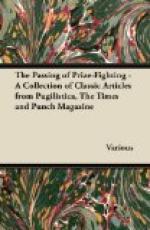HENRY LARRIKIN, who was recently convicted and sentenced to death for the murder of a nursemaid and infant on Shooter’s Hill, is now confined in —— Gaol, and is reported to be in excellent spirits. He passes his time in illuminating texts, which he presents to the Governor and Warders, and some of which have been disposed of for enormous sums. A petition has been circulated, and extensively signed, praying for a remission of his sentence, on the ground of provocation, it having since transpired that the infant put out its tongue in passing. Several Jurymen have said, that had this fact been brought before them at the trial, they would have returned a very different verdict. Much sympathy is expressed with LARRIKIN, who is quite a young man. He expresses himself as sanguine of a reprieve.
CENTRAL NEWS TELEGRAM.—LATER INTELLIGENCE.
Monday.—LARRIKIN was informed this afternoon, by the Governor of the Gaol, that the HOME SECRETARY saw no grounds for interfering with the course of the Law, and that the sentence would consequently be carried out on Friday next. Two of the Warders, with whom LARRIKIN is a great favourite, on account of the affability and singular modesty of his demeanour, were deeply affected, but the prisoner himself bore the news with extraordinary fortitude and composure. His sole comment upon the intelligence was, that it was “just his blooming luck.” By special favour of the Authorities he is allowed to see the comments of the Press upon his case, in which he takes the keenest interest. A statement that he had on one occasion been introduced to the nursemaid, through whom his career has been so tragically cut short, has caused him the deepest irritation. He wishes it to be distinctly understood that both she and her infant charge were absolute strangers to him.
LATER TELEGRAM.
Wednesday Morning.—LARRIKIN continues wonderfully calm. He is writing his Memoirs, which he has already disposed of to a Newspaper Syndicate for a handsome consideration. Those who have been privileged to see the manuscript report that it reveals traces of unsuspected literary talent, and is marked in places by a genial and genuine humour. LARRIKIN’s great regret is that he will be unable to have an opportunity of perusing the press-notices and reviews of this his first essay in authorship, for which he expects a wide popularity.
FROM A SPECIAL CORRESPONDENT.
Thursday.—To-day LARRIKIN received a visit from an old friend, who was visibly moved during the interview, in spite of the prisoner’s efforts to console him. “There’s nothing to snivel about, old man,” he said repeatedly, with a tranquil smile. He then inquired if it was true that there were portraits of him in several of the papers, and was anxious to know if they were like him. He has executed his will, leaving the copyright of his manuscript, his sole assets, to his father, who has been in a comparatively humble position




